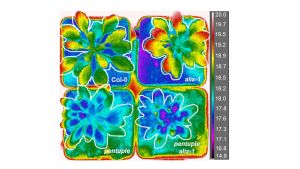“Es importante conocer cómo funciona la ruta de señalización de esta hormona- nos comenta el Dr. Rubio- ya que el ABA también produce efectos negativos como la reducción en el crecimiento y desarrollo de las plantas para reducir el consumo de agua”.
Los receptores de ABA son capaces de detectar pequeñas variaciones en los los niveles la hormona y permiten a la planta responder de una forma rápida al estrés hídrico mediante la activación de distintos mecanismos moleculares. Entre ellos, el ABA controla un gran número de respuestas transcripcionales, así como la regulación de las acuaporinas, unas proteínas de membrana que controlan el flujo de agua celular.
Una vez que la planta se ha adaptado a las condiciones de estrés, es necesario que se produzca una desensibilización de la señalización del ABA, es decir, un “apagado” de la ruta, mediante la inactivación de los receptores, para que sus efectos no sean perjudiciales en el desarrollo de la planta. García-León et al. han demostrado que ALIX se una directamente a varios miembros de la familia PYR/PYL/RCAR de receptores de ABA y promueve su posterior degradación en la vacuola, controlando de este modo su abundancia.
De esta forma, han comprobado que los mutantes de pérdida parcial de función de ALIX (alix-1) son plantas hipersensibles al ABA con defectos graves en el desarrollo temprano, longitud de la raíz, apertura de estomas, etc. Además, el fenotipo de hipersensibilidad de alix-1 se revierte cuando los receptores PYR/PYL/RCAR no son funcionales, demostrando así que ALIX contribuye a la percepción y la señalización del ABA mediante un mecanismo de regulación negativa desencadenado por el aumento de los niveles de la hormona.
El grupo del Dr. Rubio ha empezado ya a estudiar cómo el ABA es capaz de promover la degradación de algunos receptores, pero no de otros, lo que será de gran utilidad para conocer mecanismos que gobiernan el crecimiento de las plantas en respuesta a la disponibilidad de agua. Además, ya están trabajando en el desarrollo de nuevas líneas de Arabidopsis que expresen versiones modificadas de ALIX capaces de ajustar la apertura y el cierre de los estomas para mejor la eficiencia del uso del agua y, posteriormente, mediante técnicas de edición genética, desarrollar estas versiones en plantas cultivadas para mejorar su productividad.
Stomatal aperture and turnover of ABA receptors are regulated by Arabidopsis ALIX. García-León M1, Cuyas L, Abd El-Moneim D, Rodriguez L, Belda-Palazon B, Sánchez-Quant E, Fernández Y, Roux B, Zamarreño AM, Garcia-Mina JM, Nussaume L, Rodriguez PL, Paz-Ares J, Leonhardt N, Rubio V. Plant Cell. 2019 Jul 30. doi: 10.1105/tpc.19.00399.






